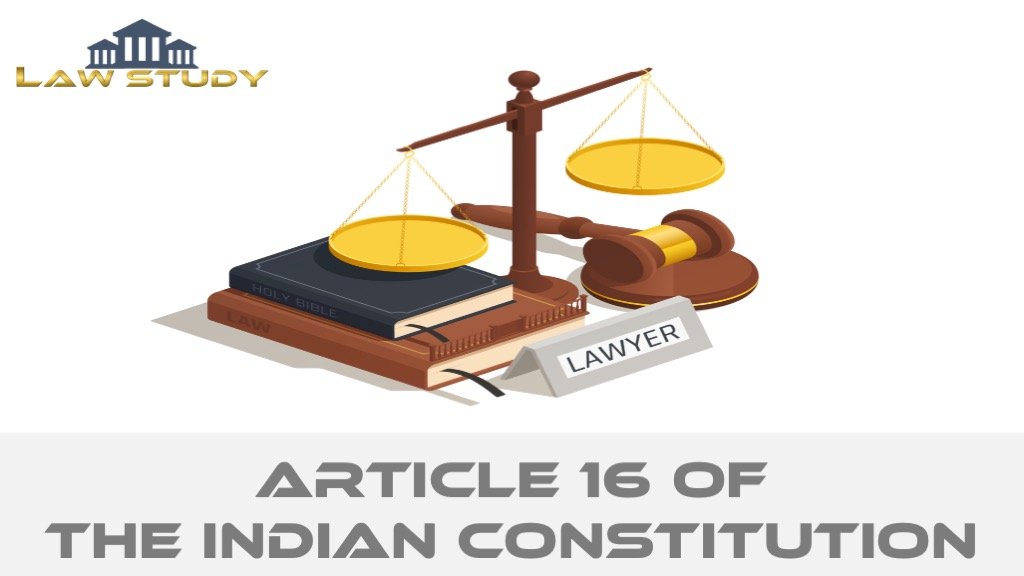The equality of opportunity in the matters of public employment under Article 16 of the Indian constitution. The state shall not make any discrimination(unfairness) among the citizens on the ground of:-
- RELIGION
- RACE
- CASTE
- SEX
- DECENT
- RESIDENCE
- PLACE OF BIRTH
- ANY OF THEM
Article 16 guarantees equality of opportunity in matters of appointment in State services test recruitment for government services. The Protections and Rights are provided under Articles 15 and 16 for any welfare state. Dr. B.R. Ambedkar has called the Rights under Articles 15 and 16 as complimentary benefits.
Exceptions to Article 16(1) and 16(2)
Under Art- 16(3), Parliament may take a law to prescribe a requirement as to residence within a State or Union territory for eligibility to be appointed with respect to a specified number of appointments or posts.
A.V.S. Narasimha Rao v. State of Andhra Pradesh (AIR-1970)
The Supreme Court declared that part of the Act unconstitutional which prescribed a residence qualification for govt. services in Telangana – a part of the State of Andhra Pradesh.
Art- 16(5), provides that the incumbent of an office in connection with the affairs of any religious or denominational institution or any member of the governing body thereof shall be a person professing (believe) a particular religion or belonging to a particular denomination.
Under Art- 16(4), the state may make any provision for the reservation of appointments or posts in favor of any ‘backward class of citizens which, in the opinion of the State, is not adequately (sufficient) represented in the services under the State.
Important cases to understand Article 16
Balbir Kaur vs. Steel Authority of India Ltd. (AIR 2000 SC 1596)
In this case, the apex court held that appointment on compassionate grounds of a son, daughter, or widow to assist the family to relieve economic distress because of the sudden demise in hardness of a govt. The servant has been held to be valid.
Shiv Charan Singh vs. State of Mysore (AIR-1965)
Provisions for compulsory retirement of govt servants in public interests do not infringe Articles 14 and 16.
Randhir Singh vs. Union of India (AIR-1982)
It has been held that equal pay for equal work although not expressly declared to be a Fundamental right is clearly constitutional under Article 14, 16, and 39 (c) of the constitution and can be enforced by the courts.
Devdason vs. Union of India (AIR-1964)
In this case, the constitutional validity of the “carry forward rule” in services was involved. The Supreme Court by a majority of 4 to 1 struck down the carry forward rule as unconstitutional on the ground that the power vested in govt. under Art.16(4) could not be exercised so as to deny reasonable equality of opportunity in matters of public employment for members of classes other than backward.
Akhil Bhartiya Sashit Karamchari vs. Union of India
In this case, while overruling the T. Devadasan case, S.C held that the carry forward rule is valid. Court held that the ceiling limit of 50% is just a guideline, and if it’s required the ceiling limit of 50% can be exceeded as well. In this case, the reservation reached up to 64% and it was held to be valid.
N.M Thomas vs. State of Kerala
It was held that reservation in promotion is valid.
Landmark judgment (Indira Sawhney case) Known as Mandal Commission
Indira Sawhney vs. Union of India (AIR 1993 SC 477)
Justice B.P. Jeevan Reddy, it was a constitutional bench judgment ratio of 6:3 (Mandal Commission). The mandal case is known as the Indira Sawhney case
- It was held that the concept of the reservation to an extent is an Anti-Maritarial. However, it was also held that in order to do away with the social injustice compromise has to be made to that extent.
- The extent of the reservation should be max. 50% including the carry-forward rule. However, in M. Nagaraj vs. Union of India 2007 S.C, it was held that if it can be justified on the basis of quantifiable data (actual data) the reservation can go beyond 50%.
- The criteria for a reservation shall be cast but at the same time economy criteria shall also be taken into account. The creamy layer from other backward classes is excluded. However, the court did not talk about the exclusion of the creamy layer from the SC&STs categories.
- Article 16(4) is exhaustive about reservations in govt jobs only, however, Article 15 (4) is not exhaustive about reservations in govt. jobs, reservation can be provided on certain grounds under Article 14.
- The backward classes can be further divided into backward and more backward its known as horizontal classification.
- Article 15(3) or Article 15(4) & 16(4) are not exceptions to Article 15(1), 16(1), and also Article(4). They are extensions/ of these Articles.
- It was held that reservation cannot be granted in the promotion.
E.P. Royappa vs. State of Tamil Nadu 1974 S.C
In this case, Justice Bhagwati has held that the concept of equality is not limited only to the concept of reasonable classification. A reasonable classification is just one of the tools to attain equality. The concept of fairness, justice, equity, reasonableness, and non-arbitrariness is certain concepts that are the real faces of the concept of equality. Thus, if under any law or executive action reasonableness or justice is denied or an arbitrary action is taken it is per se a denial of equality.
Ajay Hasia vs. Khalid Mushis 1981
S.C., Justice Bhagwati held that arbitrariness is antithetical to equality. Equality and arbitrariness cannot go hand in hand. A reasonable classification is just one face of equality and we have to check the purpose of law and then reasonable classification.
If the law is arbitrary, unfair, or amongst then the law will be struck down on the face of which there is no question of getting R.C (Reasonable Classification).

























